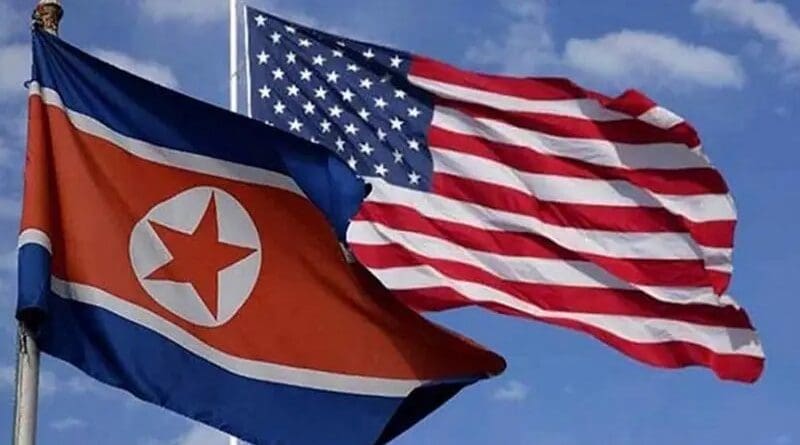Between Sanctions And Diplomacy: North Korea’s Balancing Act – Analysis
By IPCS
By Shivani Singh*
The possibility of bilateral negotiations between North Korea and the US is a sign of relief after months of prevailing tensions in the Korean Peninsula. Following a long trajectory of strained relations between North Korea and the West, North Korea has finally agreed to direct bilateral talks with the US. The reason for this is simple. There has been a change of tactics by Kim Jong-un towards a more diplomatic and cooperative approach with China, the US and South Korea. Additionally, deployment of hard diplomacy by the international community through the imposition of sanctions on North Korea finally seems to be paying off. This article argues that a combination of both these factors is what led to a thaw in the escalating conflict and is a development to be cautiously optimistic about.
Tactical Changes
Sticks in the form of international economic and diplomatic sanctions on North Korea have been in place for some time. North Korea has traditionally ignored international condemnation of its regime by taking a more aggressive stance and conducting more nuclear weapon and missile tests. However, it recently adopted a different tactic by deploying soft diplomacy measures, which included sending a North Korean delegation to the Winter Olympics to Pyeongchang, South Korea. Crucially, North Korea displayed its willingness to cooperate with South Korea by allowing the games to be concluded without tensions.
This diplomatic positioning by North Korea along with soft symbols of unity like North and South Korean athletes marching under the Korean Unification Flag and re-opening communication channels definitely contributed to pacifying bilateral relations. A South Korean delegation’s visit to North Korea to discuss peace prospects followed.
Efficacy of Sanctions
China – North Korea’s largest trade partner, accounting for 93 per cent of its overall trade – agreed to come on board in adopting the latest set of UN sanctions targeting North Korea’s oil imports and textile exports. Although China signed onto the new sanctions, as it has done in the past, there continues to be been reason to doubt both China’s intentions and the extent of its influence with North Korea.
Having said that, a considerable shift in China’s position is discernible through its ramping up sanctions implementation. Reports suggest that the effect of these sanctions is being felt on both sides of the border as they are “hitting local Chinese businesses hard and starting to bite inside North Korea, with factory closures, price rises and power shortages in some areas.” In January 2018, China reported a 10.5 per cent drop in its trade with North Korea in 2017 with an 81.6 per cent slump in China’s imports from North Korea. The gradual drop in North Korea’s trade with China is accompanied by depleting foreign currency reserves and is likely to impact its inventories of food and medical necessities and lead to price rise during decreased supply.
Signs of economic strain were evident when in his new year’s speech, Kim Jong-un suggested the possibility of future economic duress and talked about focusing on the development of domestic industries since relying on external aid was fast diminishing as an option. Despite the signs of reduced trade, opacity in China and North Korea’s trade figures continues to pose a challenge. Whether the sanctions have actually worked is thus debatable. Ultimately, however, North Korea’s decreasing access to short-term financial avenues has most definitely factored in North Korea’s calculations, and could have incentivised coming to the negotiating table.
Pursuit of Legitimacy
North Korean efforts partially contributed to the tentative diplomatic success of the US agreeing to bilateral negotiations outside of the six-party talks framework – a major concession for the North. North Korea finally perceives a chance to present itself as one nuclear-armed state negotiating with another nuclear-armed state on the same platform. This is the kind of legitimacy that North Korea has been pursuit of for decades, and these talks, in its opinion, could prove to be the first step. The question here is not whether North Korea will seriously consider a complete, verifiable, and irreversible disassembly of its nuclear arsenal. The central emphasis is that for the first time ever, a sitting US president will meet a North Korean leader and the world will recognise the North Korean regime as a legitimate party in bilateral talks with the US.
Kim Jong-un is not likely to diverge from the position of celebrating the success of achieving a complete nuclear deterrent and the ability to “mass produce nuclear warheads and ballistic missiles.” However, the current thaw could be used as an opportunity by North Korea to shed the image of an isolated ‘hermit kingdom’ through such high-level and public contact with the West.
Conclusion
Despite no change North Korea’s three conditions that would make it consider denuclearisation – the US removing its troops from South Korea, assurances of no threat of regime change, and rescinding US’ extended deterrence guarantees to South Korea and Japan – that both countries have agreed to a bilateral summit is in itself an achievement.
About the author:
Shivani Singh, Researcher, Nuclear Security Programme (NSP)

